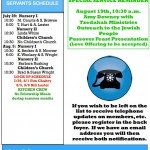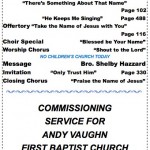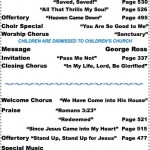15th Annual Lowndes School Prayer Walk
Attached you will find the 15th Annual School Prayer Walk information and prayer guide. You may participate in the walk at your convenience on Sunday, July 29th at any time during the day. We plan to go in between AM worship and our cluster worship time at FBC Columbus.
15th Annual School
Prayer Walk, 2012
Guest Preacher this Sunday – Rev. George Ross, Acts ONE8 – SBC Church Planting Missionary

 George Ross is Lead Pastor at Lifepoint Church in Senatobia, Mississippi. He served as Student Pastor at Longview Heights Baptist Church in Olive Branch, Mississippi from 1998 to 2004.
George Ross is Lead Pastor at Lifepoint Church in Senatobia, Mississippi. He served as Student Pastor at Longview Heights Baptist Church in Olive Branch, Mississippi from 1998 to 2004.
In 2005 George planted Lifepoint Church. He has served as Lifepoint’s Pastor for the last 6 years during which time the LORD has used Lifepoint to reach their community for Christ and sponsor new church works in Hernando, Mississippi, Montana, Toronto, and Africa. George has also been leading educational trips to Israel and other parts of the Middle East since 1999.
George and his wife, Joy, have 4 children: Isaac, Hannah Ruth, Abigail, and Jeremiah. They are devoted to family worship and raising their children in the nurture and instruction of the LORD.
George is a graduate of Crichton College in Memphis, Tennessee and received his Master of Divinity in Evangelism and Church Planting from Liberty Theological Seminary. Passionate about testifying to God’s grace, God continues to use George in Kingdom ministry as a husband, father, pastor, church planter, and conference preacher. Email: george@one8.org Twitter: @PreacherMan04
ONE8 is a cooperating network of like-minded SBC churches across Mississippi and the Mid-South working together to advance the gospel by planting new churches and equipping existing churches for multiplication. Our vision is to partner with churches, associations, and state conventions to help initiate a church planting movement throughout the Mid-South. Through an intensive application and assessment process, we seek to provide church planters with internships, coaching, networking, and resources.
Distinctives
ONE8 Church Planting Network is a committed partner with the SBC. All ONE8 Network Churches and Church Plants affirm the 2000 Baptist Faith and Message. The ONE Church Planting Network also affirms the following distinctives:
- We believe in the Sufficiency of Scripture
We believe the Bible is God’s Word. More importantly, we believe that it is our final authority in all matters of faith and practice. Thus, we are constantly reforming ourselves in view of God’s Word.
- We Practice Systematic Exposition
Because we believe in the inerrancy of Scripture, we practice systematic exposition in our preaching ministry. That means we preach verse by verse through sections of the Bible in order to faithfully proclaim “the whole council of God” to His people.
- We Seek Regenerate Church Membership
Our goal is not to grow as fast as we can. Our goal is to grow as healthy as we can. We are very deliberate in our membership process. Those seeking membership are carefully counseled to determine whether or not they truly understand and have experienced Biblical conversion. Our goal here is not elitism. We simply wish to avoid giving false assurance to those who are not truly regenerate. Our mission is not to get as many people to “walk the aisle” as possible. We desire to see true conversion. We constantly proclaim and explain the gospel and take our time with people struggling to understand what it means to follow Christ.
- We are Committed to Biblical Community
The Church is not a building, but a community of believers. As such we are to live in fellowship and community with one another. We must do more than just occupy pews near each other on a weekly basis to call ourselves a church. We also believe the New Testament gives us clear teaching that Biblical Converts (regenerate believers) were a part of Christian community. We do not believe that a true convert of Christ will live a life apart from the Community of Christ; His Church.
- We are Committed to Practicing a Biblical Worldview
Christianity is not merely a religion, it is also a lifestyle, a philosophy and worldview. We are to think biblically about every aspect of our lives. It is only through filtering our life choices using the Word of God as our filter that we will understand, develop, and practice a Biblical Worldview.
- We are Committed to Evangelism, Missional Living, and Church Planting.
Evangelism is simply telling non-Christians the good news about what Jesus Christ has done to save sinners. In order to biblically evangelize you must preach the whole gospel, even the hard news of God’s wrath against our sin, calling people to repent of their sins and trust in Christ while making it clear that believing in Christ is costly, but worth it. Being missional results in intentionally engaging culture so that we may live out the Gospel message in word and deed. We believe this is the duty of every Christian, as Jesus commanded us to be “in” the World but not “of” the World. We also believe that Church Planting is the greatest way to advance the Gospel, and therefore are committed to being a community of Church Planting Churches.
2012 Vacation Bible School – Amazing Wonders Aviation – Monday, July 16 – Friday, July 20, 6:00 – 8:30pm
Please consider this an invitation to bring your children to Woodland Baptist Church’s 2012 Vacation Bible School, Amazing Wonders Aviation that begins this coming Monday evening at 6:00pm. Please take a moment and watch the video, print off the registration form and email the information in to us so we can be prepared for your child’s attendance next week. If you have any questions, please do not hesitate to call the office – 662-327-6689.
http://www.youtube.com/watch?v=gEjpeUBA8vk&feature=player_detailpage
Click here for registration form registration 2012, or, simply email the information to brad@woodlandonline.org or nancy@woodlandonline.org
Great Article from The Gospel Coalition – Tim Keller
Tim Keller|10:00 PM CT
Making Sense of Scripture’s ‘Inconsistency’
I find it frustrating when I read or hear columnists, pundits, or journalists dismiss Christians as inconsistent because “they pick and choose which of the rules in the Bible to obey.” Most often I hear, “Christians ignore lots of Old Testament texts—about not eating raw meat or pork or shellfish, not executing people for breaking the Sabbath, not wearing garments woven with two kinds of material and so on. Then they condemn homosexuality. Aren’t you just picking and choosing what you want to believe from the Bible?”
I don’t expect everyone to understand that the whole Bible is about Jesus and God’s plan to redeem his people, but I vainly hope that one day someone will access their common sense (or at least talk to an informed theological adviser) before leveling the charge of inconsistency.
First, it’s not only the Old Testament that has proscriptions about homosexuality. The New Testament has plenty to say about it as well. Even Jesus says, in his discussion of divorce in Matthew 19:3-12, that the original design of God was for one man and one woman to be united as one flesh, and failing that (v. 12), persons should abstain from marriage and sex.
However, let’s get back to considering the larger issue of inconsistency regarding things mentioned in the Old Testament no longer practiced by the New Testament people of God. Most Christians don’t know what to say when confronted about this issue. Here’s a short course on the relationship of the Old Testament to the New Testament.
The Old Testament devotes a good amount of space to describing the various sacrifices offered in the tabernacle (and later temple) to atone for sin so that worshipers could approach a holy God. There was also a complex set of rules for ceremonial purity and cleanness. You could only approach God in worship if you ate certain foods and not others, wore certain forms of dress, refrained from touching a variety of objects, and so on. This vividly conveyed, over and over, that human beings are spiritually unclean and can’t go into God’s presence without purification.
But even in the Old Testament, many writers hinted that the sacrifices and the temple worship regulations pointed forward to something beyond them (cf. 1 Sam. 15:21-22; Ps. 50:12-15; 51:17; Hos. 6:6). When Christ appeared he declared all foods clean (Mark 7:19), and he ignored the Old Testament cleanliness laws in other ways, touching lepers and dead bodies.
The reason is clear. When he died on the cross the veil in the temple tore, showing that he had done away with the the need for the entire sacrificial system with all its cleanliness laws. Jesus is the ultimate sacrifice for sin, and now Jesus makes us clean.
The entire book of Hebrews explains that the Old Testament ceremonial laws were not so much abolished as fulfilled by Christ. Whenever we pray “in Jesus name” we “have confidence to enter the Most Holy Place by the blood of Jesus” (Heb. 10:19). It would, therefore, be deeply inconsistent with the teaching of the Bible as a whole if we continued to follow the ceremonial laws.
Law Still Binding
The New Testament gives us further guidance about how to read the Old Testament. Paul makes it clear in places like Romans 13:8ff that the apostles understood the Old Testament moral law to still be binding on us. In short, the coming of Christ changed how we worship, but not how we live. The moral law outlines God’s own character—his integrity, love, and faithfulness. And so everything the Old Testament says about loving our neighbor, caring for the poor, generosity with our possessions, social relationships, and commitment to our family is still in force. The New Testament continues to forbid killing or committing adultery, and all the sex ethic of the Old Testament is re-stated throughout the New Testament (Matt. 5:27-30; 1 Cor. 6:9-20; 1 Tim. 1:8-11). If the New Testament has reaffirmed a commandment, then it is still in force for us today.
The New Testament explains another change between the testaments. Sins continue to be sins—but the penalties change. In the Old Testament sins like adultery or incest were punishable with civil sanctions like execution. This is because at that time God’s people constituted a nation-state, and so all sins had civil penalties.
But in the New Testament the people of God are an assembly of churches all over the world, living under many different governments. The church is not a civil government, and so sins are dealt with by exhortation and, at worst, exclusion from membership. This is how Paul deals with a case of incest in the Corinthian church (1 Cor. 5:1ff. and 2 Cor. 2:7-11). Why this change? Under Christ, the gospel is not confined to a single nation—it has been released to go into all cultures and peoples.
Once you grant the main premise of the Bible—about the surpassing significance of Christ and his salvation—then all the various parts of the Bible make sense. Because of Christ, the ceremonial law is repealed. Because of Christ, the church is no longer a nation-state imposing civil penalties. It all falls into place. However, if you reject the idea of Christ as Son of God and Savior, then, of course, the Bible is at best a mishmash containing some inspiration and wisdom, but most of it would have to be rejected as foolish or erroneous.
So where does this leave us? There are only two possibilities. If Christ is God, then this way of reading the Bible makes sense. The other possibility is that you reject Christianity’s basic thesis—you don’t believe Jesus is the resurrected Son of God—and then the Bible is no sure guide for you about much of anything. But you can’t say in fairness that Christians are being inconsistent with their beliefs to follow the moral statements in the Old Testament while not practicing the other ones.
One way to respond to the charge of inconsistency may be to ask a counter-question: “Are you asking me to deny the very heart of my Christian beliefs?” If you are asked, “Why do you say that?” you could respond, “If I believe Jesus is the resurrected Son of God, I can’t follow all the ‘clean laws’ of diet and practice, and I can’t offer animal sacrifices. All that would be to deny the power of Christ’s death on the cross. And so those who really believe in Christ must follow some Old Testament texts and not others.”








